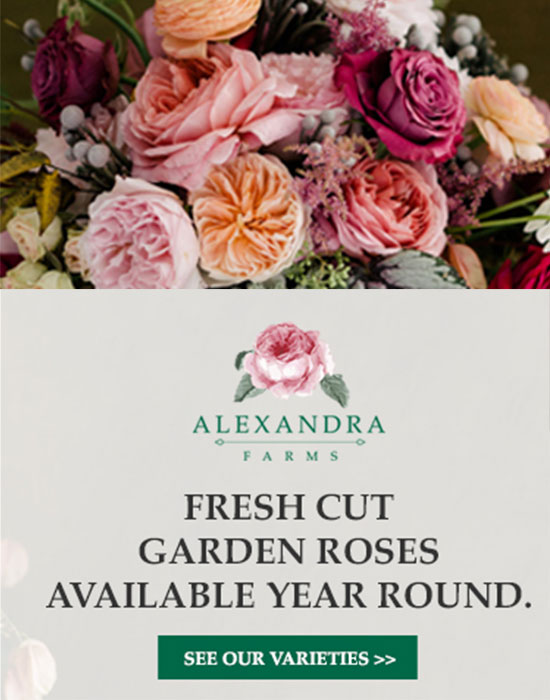How the floral industry is working to become more diverse.
Systemic racism has become a topic of primary interest around the nation. As headlines blare news about racial disparities in the society at large, businesses everywhere are asking themselves two important questions: What inequities exist in our own organization, and how can we rectify them?
“This is a good time to deal with racial equality in the workplace because recent events have made the topic uppermost in our minds,” says David Campt,founder of The Dialogue Company, a diversity and inclusion consulting firm in Eden, N.C. “We’re seeing something that might be a real tipping point in the nation and that will be talked about 30, 40 or 50 years from now. When something important is happening in society, we don’t want to let discomfort keep us from discussing what’s obviously on peoples’ minds.”
Ariana Marbley, CEO of Esscents of Flowers in East Oakland, says, unequivocally, that there is a lack of diversity in the floral industry, something she’s noticed walking through the flower markets and scrolling through the social media feeds of those in the industry.
“For the longest time, I had the worst ‘imposter syndrome,’ feeling like I didn’t belong. I would purposefully not post my face on my social media because I felt like once people saw that mine is a black- woman-owned business, there may be a different feeling toward the product being produced,” she says. “While I have since worked on being bold, I have seen a bit of an increase in highlighting other people of color in the floral business, but there’s a whole lot more work to be done.”
Marbley doesn’t blame a lack of interest by minorities but more a lack of exposure to the industry. “There are not enough programs, particularly in the inner cities, where a majority of minorities live,” she says. “I was fortunate to have a grandfather who introduced me to gardening. If it wasn’t for him, I’m not sure I would’ve fallen in love with what I do now.”
One way she’s tried to help is by adding Adanna Omeni a mentoring component to pop-up shops around Oakland. “I started with my niece, and she would attend pop-ups with me. My goal was to teach her what I know about flower arranging,” Marbley says. “Whether or not she wanted to have a floral business, the exposure to the business as a whole was a great life lesson.”
Adanna Omeni, owner of 1 Blossom 2 Bloom Floral Design in Knightdale, N.C., became interested in the floral industry working at a friend’s floral shop as a teenager. It took her a while to venture off on her own because she was afraid that she wouldn’t succeed in a field dominated by white designers.
“Living in North Carolina, there’s not a huge rainbow of people considering it’s an industry filled with nothing but colors,” she says. “I feel like diversity should be involved in all aspects of floral—from the growing to design.”
In an effort to get more minorities interested in the field, Omeni offers floral design classes at her shop, hoping to plant a seed that leads to other industry professionals who look like her.
Nakia Gouldbourne, owner of K. Vera Florals & Styling in Margate, Fla., took a class in floral design years ago and found she had a knack for creating beautiful arrangements, so she started going to more classes and industry events. Living in South Florida, she did come across people from all races in the floral industry, and she was glad to see that.
“In this business, you have the opportunity to work with clients from all diff erent backgrounds and cultures, so I’ve found it to be a great industry as far as diversity,” she says. “I think there’s been more of a push now, with everything going on, to highlight more diverse florists and try to put us at the forefront and in the spotlight.”
Ross D., owner of Heather’s Flowers in Venice, Calif., is a Turkish immigrant who has been involved in the floral industry for more than 30 years. “I represent the American dream,” he says. “I started in the beauty salon next door, worked my way to own the beauty salon, and when Heather passed away, I sold the salon and bought Heather’s flower shop.”
Ross knows of other Persian florists in the area, and he thinks the key to a diverse industry is to treat everyone equally and not be provoked by people or the media. “Don’t see only the bad,” he says. “It’s a big world out there, and you have to respect everyone, regardless of his or her ethnic background or race.”
Many floral shops are finding that having a diverse team is also important because it shows customers that their interests are represented. “One of the things we’ve learned over the years is that diversity within teams produces a diversity of thought that can lead to better outcomes if it is handled well,” Campt says
Organizations with good reputations can attract more top performers, and fair treatment can keep them from jumping ship.
In creating a workplace of inclusion, the first step is to realize that discrimination is generally unintentional. “The most important mental shift we can make is to re-conceptualize the problem of racial bias,” says Campt. “Rather than a crime against the social contract done only by evil people, bias is more like a glitch in thinking that everybody is subject to. We are biased not because we are bad people but because our brains are inherently that way.”
That collective unconscious mindset sparks real-world discriminatory acts. For instance, decisions such as hiring, mentoring, promoting and the assigning of work duties may be done with a racial slant without the owners even realizing.
“Most people are not racists or bigots, but they can make judgments based on stereotypes they have learned from the surrounding culture,” says James J. McDonald Jr., managing partner at the Irvine, Calif., office of Fisher & Phillips, a labor and employment law firm. “As a result, they make decisions based on race or other protected categories without even realizing it.”
Remember, enlightened communications and respect toward others, combined with a carefully designed and implemented diversity an inclusion programs, can obviate racial resentments and foster a more collegial atmosphere. The result can be more effective teamwork, a more efficient workplace and a more profi table floral business.






















